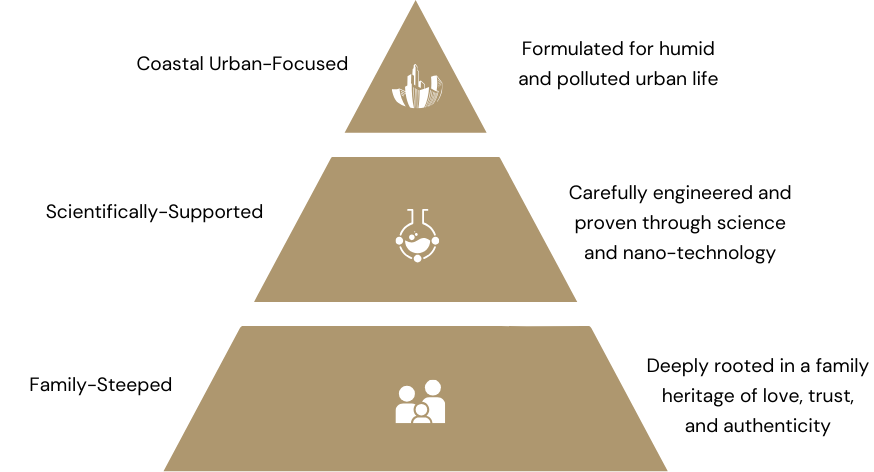We are the future of skincare, continuously pushing boundaries and challenging the status quo to bring one’s true self-confidence, around the polluted cities of the world.
Our range of solutions are catered to the environment of urban-living, giving all individuals a radiant and youthful glow. We believe that everyone deserves to feel beautiful in their own skin wherever.

Specifically
engineered for
city-proofing
urban skin

Demonstrating
empathy for the
planet by
rejecting The
Dirty Ten

Born out of familial
love and 30 years
of expertise,
building strong
trust to its
community
Coastal Urban-Focused
Scientifically-Supported
Family-Steeped


Formulated for humid
and polluted urban life
Carefully engineered and
proven through science
and nano-technology
Deeply rooted in a family
heritage of love, trust,
and authenticity
vision
We do not settle for mediocrity. We live under the same sky, breathe the same air, we are the same, understanding the urban challenges towards our health. Hence, we aspire to make vibrant, healthy skin an attainable luxury for everyone, safeguarding it from urban environmental aggressors by tailoring our solutions to individual needs.
mission
Through the artful blend of science, sustainability, and advanced nanotechnology, we create formulations that deeply rejuvenate and transform the skin from within. 30 years of skin health expertise drives us to pioneer biomimetic solutions to elegantly restore and fortify the skin barrier, ensuring a radiant, timeless glow tailored to each individual.
TiN5 formulates without these
These are the 10 common ingredients we do not include in all our solutions. We aim to create ones that inspire trust and confidence for those who use TiN5.
BHA (Butylated Hydroxyanisole) and BHT (Butylated Hydroxytoluene) are used to extend shelf life. These chemicals are also linked to a wide range of serious health problems, including organ-system toxicity, skin irritation and potentially causing cancer in living tissue. Furthemore, these chemicals are listed as potential concern by the Convention for the Protection of the Marine Environment of the North- East Atlantic, because of its tendency to bioaccumulate and because it’s toxic to aquatic organisms.
Dehydrating alcohols may lead to skin irritation and skin redness; because alcohol enhances the penetration of other ingredients, skin may be more likely to absorb potentially toxic or harmful contaminants in a product.
Petroleum can help to soften, cleanse, and moisturise dry skin. However, prolonged and continuous use of petroleum can potentially cause primary skin irritation and skin redness. Moreover, soil pollution caused by petroleum is one of the most severe problems faced by the global environment. It can clog pores in the soil, leading to reduced aeration and water infiltration.
Chemical sunscreens are absorbed into the skin which can cause irritation, skin redness, swelling, itching, rashes, and even hormonal imbalance for some. Also, chemical sunscreens are a threat and are toxic to a range of species in oceans, rivers and lakes when chemical sunscreens wash off the skin and enter waterways.
Parabens are commonly used as preservatives; which can sensitise skin which causes skin irritation, redness and causing allergic reaction, it can also elevate cellular level damage caused by UV exposure, which may lead to skin cancer. Paraben is also linked to ecological harm, even low levels of butylparaben can kill coral.
Phthalates are a group of chemicals used to make plastics more durable and are used to help dissolve other material. Phthalates are detrimental to the reproductive, neurological, and developmental systems of humans from multiple exposure pathways; it can be delivered into the body via inhalation, dietary intake, and skin absorption. Researches have shown that phthalates are carcinogens that can affect the liver, kidneys, lungs, reproductive system, and increase the risk of stillbirths.
Silicones are best known for their occlusive properties, which create a barrier-like coating to your skin that is resistant to water and air. Not only does it dry out your skin, clog your pores and block other ingredients from absorbing into your skin. But also terrible for the environment as it is non recyclable and not bio-degradable.
SLS (Sodium Lauryl Sulfate) is widely used as a cleaning and foaming agent. SLS can irritate eyes, skin, and lungs, especially with long-term use; it is also cited as causing severe eye damage and blindness by the National Library of Medicine. In addition, sulfates contribute to acidification of surface water and soil, and contribute to acid rain and fog that damage ecosystems, aquatic environment, forests and plants.
Synthetic dyes are chemical additives added to skincare and beauty products to create certain shades and colours. It can increase skin irritation, blocked pores, sensitise the skin, inflammation and cause acne breakouts. The production of synthetic dyes cause air pollution, water pollution, and soil pollution.
Synthetic fragrances replicate the scent of natural fragrances and are made up of chemical compounds composed of aromatic raw materials. Having synthetic fragrances defeats the purpose of skincare as it is the leading cause of skin irritation, contact dermatitis, cancer, hormone disruption, and reproductive problems. On the other hand, many synthetic fragrances are made from petrochemical derivatives, such as petroleum or coal tar. These chemicals are considered greenhouse gases, which makes them bad for our atmosphere and our air quality.
The sibling duo are committed to continue their family legacy on crafting skin health solutions. Hence, TiN5 was born out of love with the three upholding values, aiming to share to the world their story through the products.
Meet our founders, Nicholas and Karen
Scientific research and purpose have been passed down through the family, nurturing a tradition of innovation.
